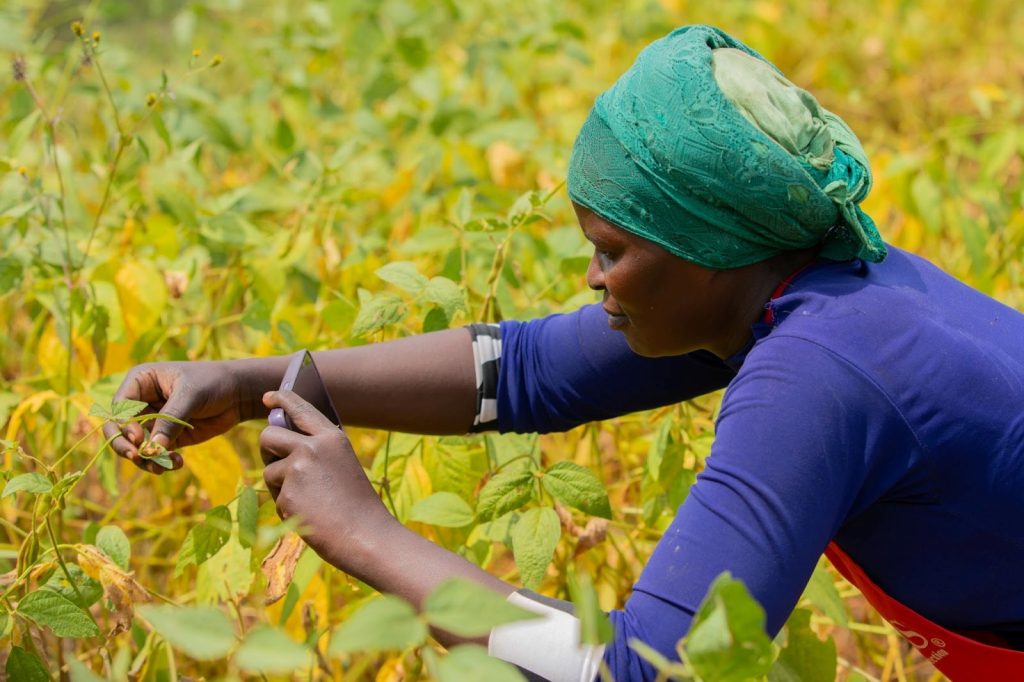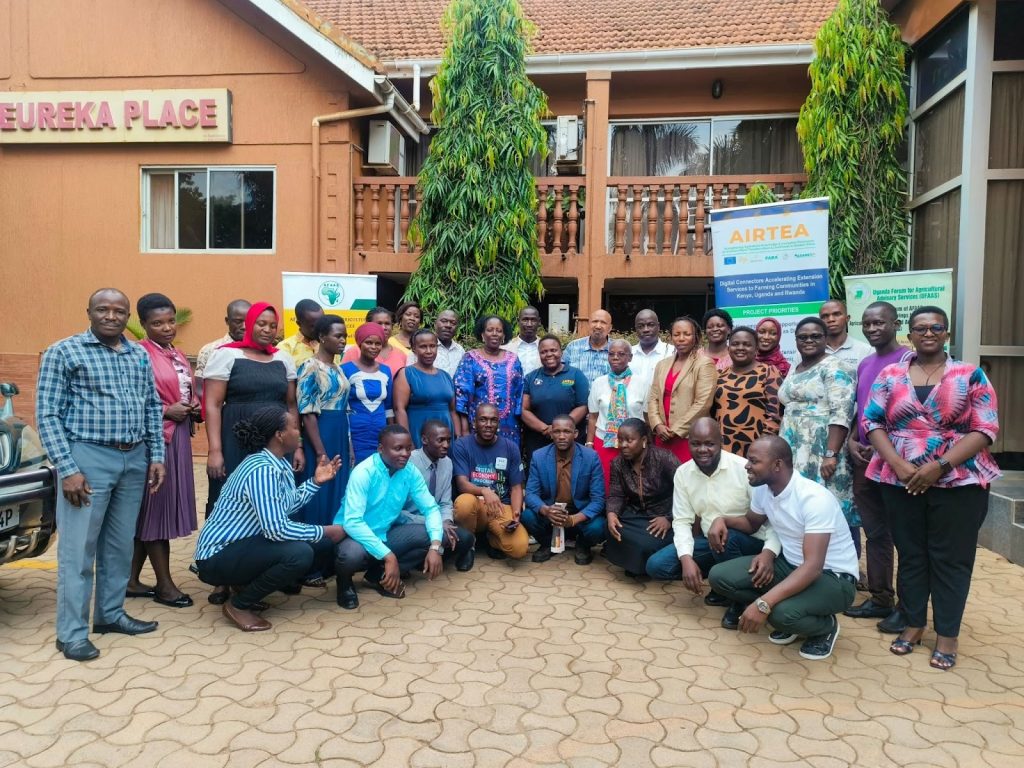
“The agricultural sector in East Africa is undergoing a significant transformation with the introduction of this Digital Connectors initiative. This project is focused on enhancing agricultural extension and advisory services in Kenya, Uganda, and Rwanda through digitalization. By leveraging digital tools and platforms, the initiative aims to improve access to farming information, boost productivity, and create employment opportunities for rural youth and women”. These were some of the remarks by Adeline Muheebwa, Chairperson of the Uganda Forum for Agricultural Advisory Services (UFAAS), at the opening of the experience sharing and capitalization meeting for AIRTEA project in Uganda.
The workshop, which brought together key stakeholders to discuss the progress, challenges, and future prospects of the innovative initiative, is one of the endline capitalisation workshops held in both Uganda and kenya. The Uganda meeting was held at Eureka Hotel in Ntinda and attended by the Digital connectors, the Innovation platform leads, the host district technical leaders, policymakers from the Ministry of Agriculture, Animal Industry, and Fisheries, and farmers from the project implementation areas. The discussions underscored the need for revenue-based models in agricultural extension services to ensure long-term sustainability.
Officiating the workshop opening, Dr. Silim Mohammed Nahdy, the African Forum for Agriculture Advisory Service (AFAAS) Executive Director, called on digital connectors to scale further to ensure financial sustainability, stating that this was the whole concept of blended business models.
“We need to ensure innovations and enterprises started by the digital connectors bring in a revenue stream, this has been my call that youth have a role to play in advisory service delivery, but we need to emphasize the adoption of sustainable blended business models,” remarked Dr Nahdy.
He further advised the digital connectors to focus on a revenue-based business model, not the conventional, autocratic, pension business model. saying AFAAS’s focus is to encourage developing financially viable models that do not solely rely on donor funding.
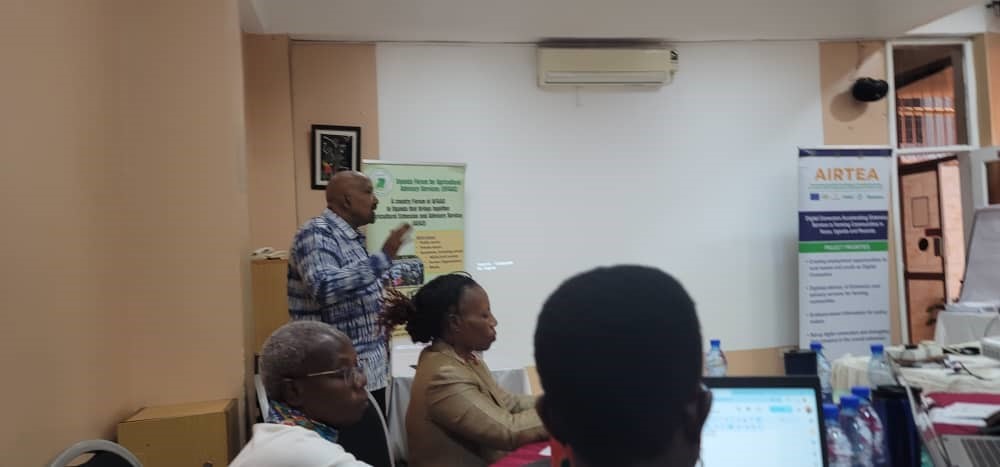
“This AIRTEA project builds upon previous agricultural extension services but with a shift towards digitalization. If AIRTEA does not make money for the Digital Connectors, then it’s not worth talking about. It is time we integrate financial sustainability into extension services to ensure long-term impact.” said Dr Nahdy
Dr. Patience Rwamigisa, Assistant Commissioner for Extension at Uganda’s Ministry of Agriculture, Animal Industry and Fisheries, said that by leveraging mobile applications, online platforms, and digital advisory tools, the AIRTEA project initiative is moving away from traditional extension methods towards a more integrated, technology-driven approach. “This transformation enhances real-time information sharing, increasing both productivity and efficiency,” remarked Dr. Rwamigisa.
He also spoke on the role of digitalization and pluralization in overcoming these challenges, highlighting digital technology as essential in transforming extension services. “Digital tools enable us to reach more farmers with real-time, tailored advice, helping them make informed decisions,” he noted. By leveraging pluralistic approaches, African agricultural systems can integrate both public and private sector services, which, according to Dr. Nahdy, allows the use of diverse perspectives and resources to meet farmers’ unique needs.
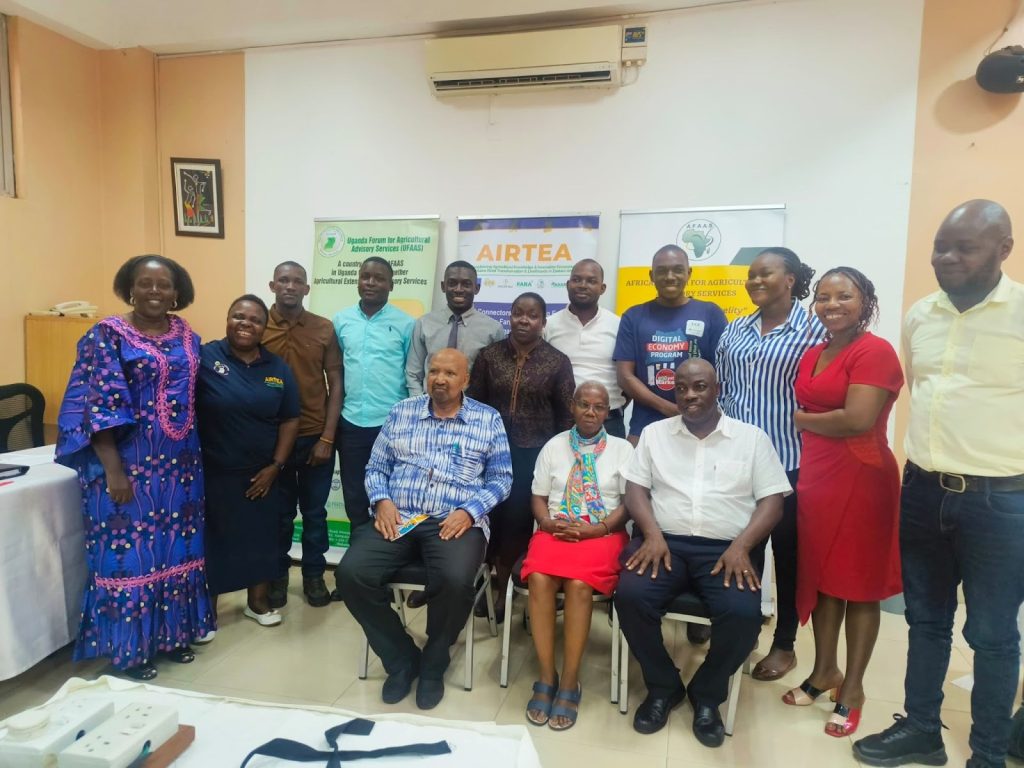
Dr Rwamigisa further noted that the AIRTEA project directly feeds into the Ministry’s digitalization strategy, which integrates multiple digital components to provide timely and efficient services to farmers.
“The project aligns well with many ministry extension components, which include:
- e-Knowledge Management System where a digital repository containing agricultural policies, extension manuals, and research materials accessible to all stakeholders,
- e-Advisory System – which enables farmers to submit inquiries and receive expert guidance from local extension agents in real-time,
- e-Weather, which works in collaboration with meteorological departments to provide instant weather forecasts and advisories, reducing bureaucratic delays in communication,
- e-Grievance Management System, which allows farmers to report concerns and receive quick resolutions, fostering accountability and service improvement,
- e-Crisis Management, which Facilitates rapid reporting of disease outbreaks and natural disasters, enhancing preparedness and risk mitigation, and,
- e-Diary, which supports supervision and management of extension agents to ensure efficiency in service delivery.” explains Dr Rwamigisa.
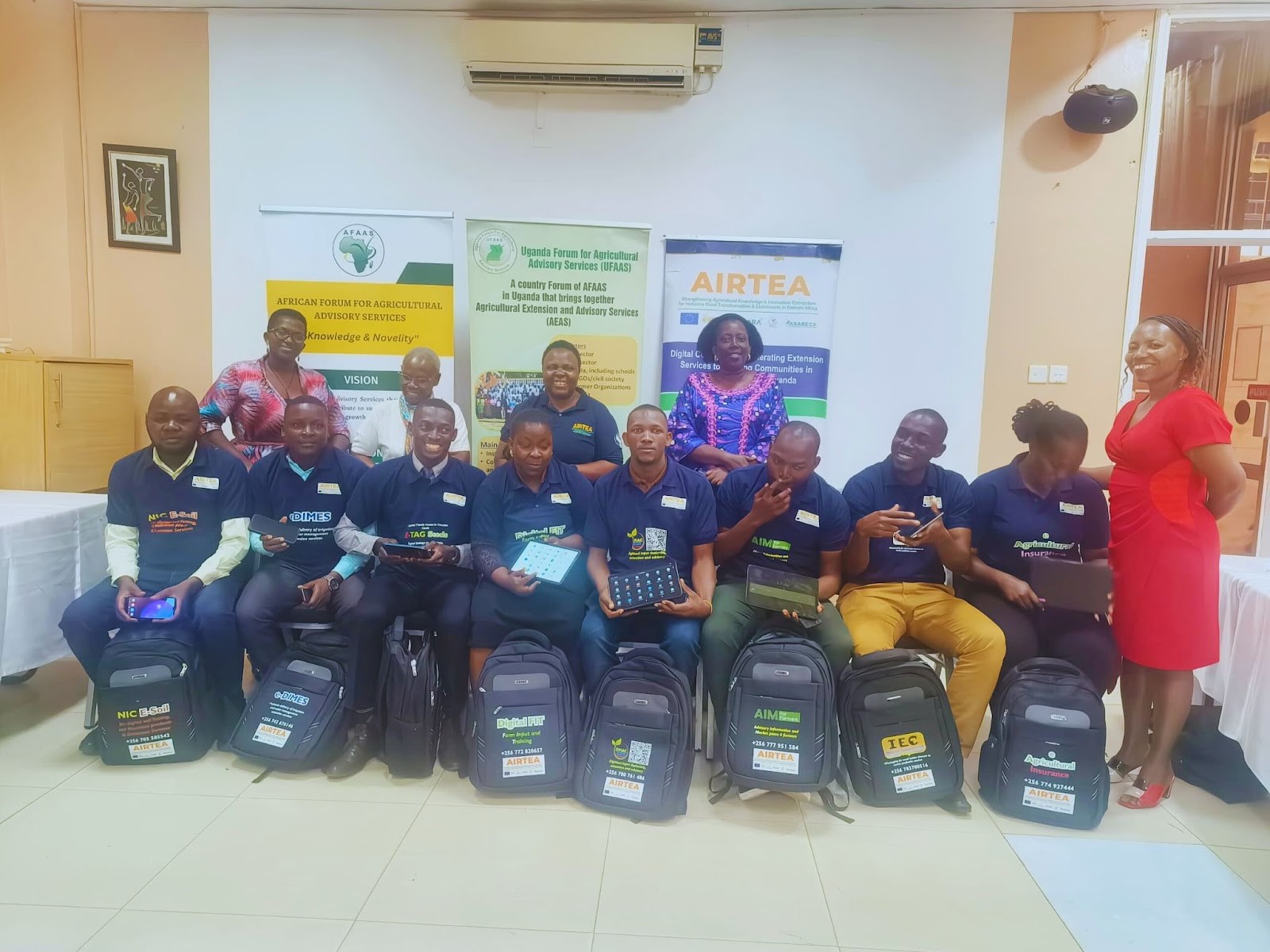
Beatrice Luzobe, the Chief Executive Officer at UFAAS, said that one of the key objectives of the Digital Connectors initiative was to create employment opportunities for rural youth and women. The project identifies individuals engaged in agricultural service provision and equips them with digital tools to enhance their efficiency.
“These Digital Connectors serve as vital intermediaries between farmers and extension services, ensuring that even remote farming communities receive timely and relevant agricultural information, remarked Luzobe.
Dr Rosemirta Birungi, the trainer from AgConnectors highlighted the role of various agricultural networks in supporting the Digital Connectors initiative, saying organizations such as UFAAS and AFAAS play critical roles in policy formulation, training, and mentoring of Digital Connectors. “The initiative has already yielded significant results, with hundreds of Digital Connectors trained and actively engaged in service provision with a focus on revenue streams. Pilot districts in Uganda, such as Bugiri, Mukono and Luweero, have witnessed notable improvements in agricultural advisory services.” said Dr Birungi
During the event, the stakeholders also discussed the operations of the project and lessons learned over the last two and a half years. They affirmed mutual benefits and linkages among digital connectors, farmers, innovation platforms, and the district’s technical and leadership components.
The DCs expressed optimism that the activities would continue because they were equipped with skills to sustain businesses while seeking revenue. “This work will continue. We have built a relationship with farming communities, and it is a win-win situation because all of us benefit. Farmers benefit from better yields, and we also earn money as commission or sale of inputs” said one of the Digital connectors.
“Digital connectors help us with feedback from the farmers–they tell us which varieties are the best and what is happening in the communities. […] The people selected were also good ‘connectors’. These days. I can also draw on them to train farmers on other things. […] Even the extension workers in the District Local government are also shifting to digital because they have learned from these digital connectors that e-extension is efficient. […] Our District was even the best implementor of the Parish Development Model”, remarked an Agricultural Officer with Bugiri District Local Government.
Farmers alike appreciated the project saying that digital connectors were very helpful in their farming operations, brought services closer to them, and introduced some new services they didn’t know, such as testing of soil. “We no longer have to travel long distances to get inputs. I just call the DC, and he sends me good fertilizer” said one of the farmers.
About the Digital Connectors for Farming Communities project:
The Digital Connectors for Farming Communities project was funded by the European Union through the OACPS Research & Innovation Programme. through a consortium of the Forum for Agricultural Research in Africa (FARA), the Association for Strengthening Agricultural Research in East and Central Africa (ASARECA), and the East African Farmers Federation (EAFF). It is implemented by a third-party entity African Forum for Agricultural Advisory Services (AFAAS), through their Country fora UFAAS and KEFAAS in Uganda and Kenya, respectively.
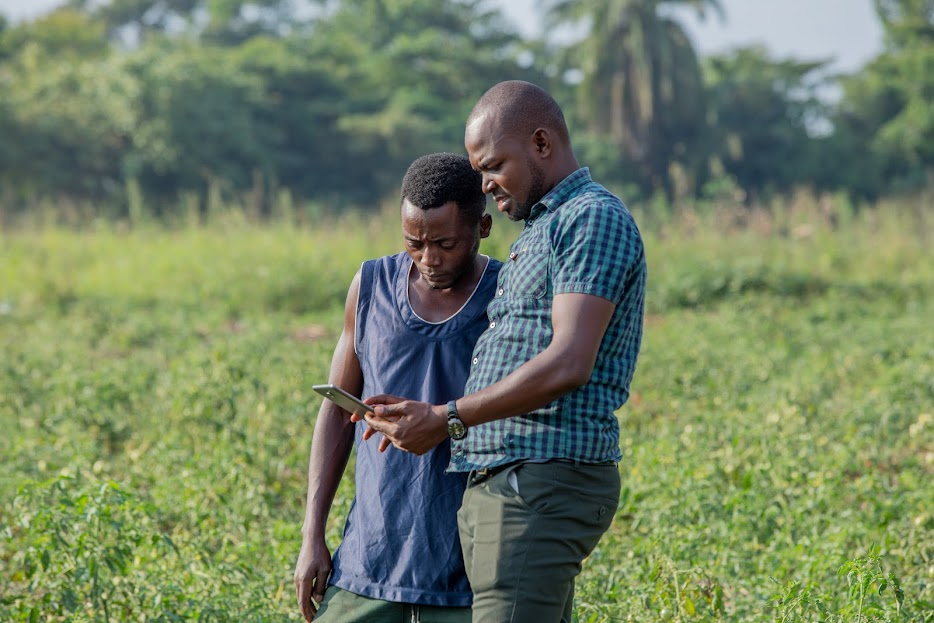
Article compiled by Grace Musimami, Communications Consultant at AFAAS, and Elizabeth Asiimwe, Communications and Knowledge Manager at UFAAS.
